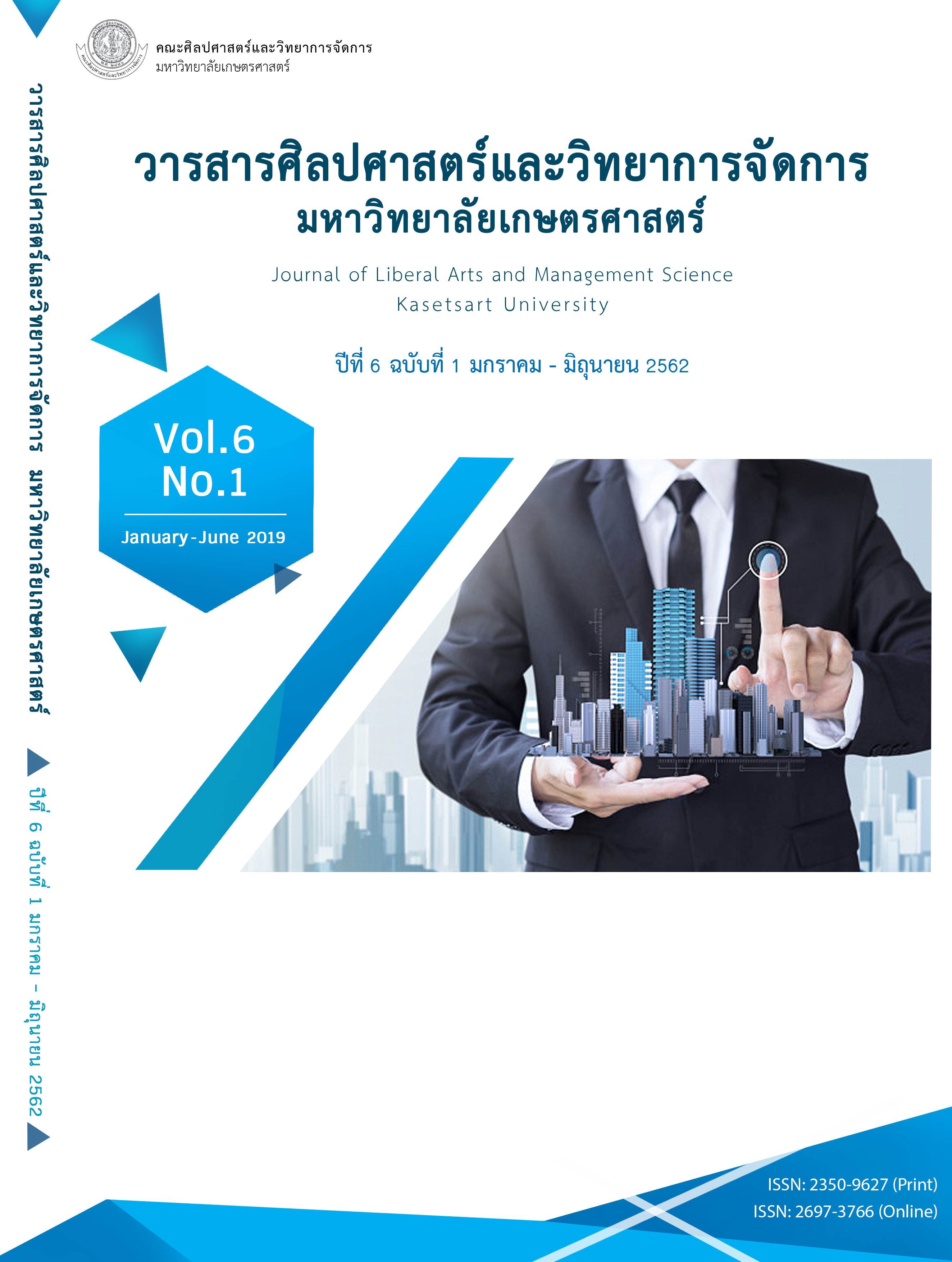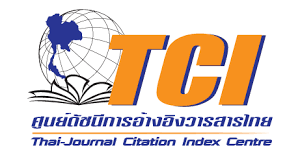ความสัมพันธ์ระหว่างคุณลักษณะของคณะกรรมการบริษัทกับการบริหารรายจ่ายภาษีของบริษัทจดทะเบียนในตลาดหลักทรัพย์แห่งประเทศไทย
คำสำคัญ:
คุณลักษณะของคณะกรรมการบริษัท, การบริหารรายจ่ายภาษี, อัตราภาษี เงินได้ที่แท้จริงบทคัดย่อ
งานวิจัยนี้มีวัตถุประสงค์เพื่อศึกษาความสัมพันธ์ระหว่างคุณลักษณะของคณะกรรมการบริษัทกับการบริหารรายจ่ายภาษีของบริษัทจดทะเบียนในตลาดหลักทรัพย์แห่งประเทศไทยระหว่างปี พ.ศ. 2556 - 2560 จำนวนทั้งสิ้น 221 บริษัท โดยไม่รวมบริษัทที่อยู่ในกลุ่มธุรกิจการเงินและกองทุนรวมอสังหาริมทรัพย์ กลุ่มที่กำลังอยู่ในระหว่างฟื้นฟูการดำเนินงาน และกลุ่มหลักทรัพย์ในตลาดหลักทรัพย์เอ็มเอไอ โดยเก็บรวบรวมข้อมูลจากระบบฐานข้อมูลตลาดหลักทรัพย์ออนไลน์ (SET SMART) วัดค่าโดยใช้โปรแกรมสำเร็จรูปวิเคราะห์ข้อมูลเชิงเศรษฐมิติ ในการทดสอบความสัมพันธ์จากค่าสัมประสิทธิ์สหสัมพันธ์ และการวิเคราะห์การถดถอยโลจิสติคทวิ (Binary Logistic Regression Analysis) ผลการศึกษาพบว่าการควบรวมตำแหน่งของประธานฝ่ายบริหารและประธานคณะกรรมการมีความสัมพันธ์เชิงบวกกับบริหารภาษีที่วัดโดยอัตราภาษีเงินได้ที่แท้จริงตามหลักการบัญชีที่รับรองทั่วไป และขนาดของคณะกรรมการบริษัทมีความสัมพันธ์เชิงบวกกับการบริหารแผนภาษีที่วัดโดยอัตราภาษีเงินได้ที่แท้จริงของงวดปัจจุบัน
เอกสารอ้างอิง
Abdul, W., Nor, S., & Holland, K. (2012). Tax planning, corporate governance and equity value. The British Accounting Review, 44(2), 111-124.
Armstrong, C. S., Blouin, J. L., Jagolinzer, A. D., & Larcker, D. F. (2015). Corporate governance, incentives, and tax avoidance. Journal of Accounting and Economics, 60(1), 1-17.
Armstrong, C. S., Blouin, J. L., & Larcker, D. F. (2012). The incentives for tax planning. Journal of Accounting and Economics, 53(1), 391-411.
Bebchuk, L. A., & Cohen, A. (2005). The costs of entrenched boards. Journal of Financial Economics, 78(2), 409-433.
Bhagat, S., & Bolton, B. (2008). Corporate governance and firm performance. Journal of Corporate Finance, 14(3), 257-273.
Chen, S., Chen, X., Cheng, Q., & Shevlin, T. (2010). Are family firms more tax aggressive than non-family firms? Journal of Financial Economics, 95(1), 41-61.
Coles, J. L., Daniel, N. D., & Naveen, L. (2008). Boards: Does one size fit all? Journal of Financial Economics, 87(2), 329-356.
Dalton, C. M., & Dalton, D. R. (2005). Boards of Directors: Utilizing Empirical Evidence in Developing Practical Prescriptions. British Journal of Management, 16(s1), S91-S97.
Desai, M. A. (2003). The Divergence between Book Income and Tax Income. Tax Policy and the Economy, 17, 169-206.
Desai, M. A., & Dharmapala, D. (2006). Corporate tax avoidance and high-powered incentives. Journal of Financial Economics, 79(1), 145-179.
Dyreng, S. D., Hanlon, M., & Maydew, E. L. (2008). Long‐Run Corporate Tax Avoidance. The Accounting Review, 83(1), 61-82.
Eisenberg, T., Sundgren, S., & Wells, M. T. (1998). Larger board size and decreasing firm value in small firms. Journal of Financial Economics, 48(1), 35-54.
Fama, E. F., & Jensen, M. C. (1983). Separation of Ownership and Control. The Journal of Law and Economics, 26(2), 301-325.
Fama, E. (1980). Agency Problems and the Theory of the Firm. Journal of Political Economy, 88(2), 288-307
Farber, D. B. (2005). Restoring Trust after Fraud: Does Corporate Governance Matter? The Accounting Review, 80(2), 539-561.
Fich, E. M., & Shivdasani, A. (2007). Financial fraud, director reputation, and shareholder wealth. Journal of Financial Economics, 86(2), 306-336.
Frank, M., Lynch, L. J., & Rego, S. O. (2009). Tax Reporting Aggressiveness and Its Relation to Aggressive Financial Reporting. The Accounting Review, 84(2), 467-496.
Gompers, P., Ishii, J., & Metrick, A. (2003). Corporate Governance and Equity Prices*. The Quarterly Journal of Economics, 118(1), 107-156.
Hanlon, M., & Heitzman, S. (2010). A review of tax research. Journal of Accounting and Economics, 50(2), 127-178.
Ibrahim, N. A., Howard, D. P., & Angelidis, J. P. (2003). Board Members in the Service Industry: An Empirical Examination of the Relationship Between Corporate Social Responsibility Orientation and Directorial Type. Journal of Business Ethics, 47(4), 393-401.
Klein, A. (2002). Audit committee, board of director characteristics, and earnings management. Journal of Accounting and Economics, 33(3), 375-400.
Lanis, R., & Richardson, G. (2011). The effect of board of director composition on corporate tax aggressiveness. Journal of Accounting and Public Policy, 30(1), 50-70.
Lehmann, E., & Weigand, J. (2000). Does the Governed Corporation Perform Better? Governance Structures and Corporate Performance in Germany. Review of Finance, 4(2), 157-195.
Li, D., Moshirian, F., Nguyen, P., & Tan, L. (2007). Managerial ownership and firm performance: Evidence from China's privatizations. Research in International Business and Finance, 21(3), 396-413.
Lipton, M., & Lorsch, J. W. (1992). A Modest Proposal for Improved Corporate Governance. The Business Lawyer, 48(1), 59-77.
Minnick, K., & Noga, T. (2010). Do corporate governance characteristics influence tax management? Journal of Corporate Finance, 16(5), 703-718.
Mulyadi, M. S., & Anwar, Y. (2015). Corporate Governance, Earnings Management and Tax Management. Procedia - Social and Behavioral Sciences, 177, 363-366.
Phillips, J., Pincus, M., & Rego, S. O. (2003). Earnings Management: New Evidence Based on Deferred Tax Expense. The Accounting Review, 78(2), 491-521.
Rego, S. O., & Wilson, R. (2012). Equity Risk Incentives and Corporate Tax Aggressiveness. Journal of Accounting Research, 50(3), 775-810.
Salihu, I. A., Obid, S. N. , & Annuar, H. A. (2013). MEASURES OF CORPORATE TAX AVOIDANCE: EMPIRICAL EVIDENCE FROM AN EMERGING ECONOMY. International Journal of Business and Society, 14(3), 412 - 427.
Stevens, J. (1996). Applied multivariate statistics for the social science. Lawrence Erlbaum Associate, Inc., Mahwah, New Jersey page 558-586.
Tang, T., & Firth, M. (2011). Can book–tax differences capture earnings management and tax Management? Empirical evidence from China. The International Journal of Accounting, 46(2), 175-204.
Taylor, G., & Richardson, G. (2014). Incentives for corporate tax planning and reporting: Empirical evidence from Australia. Journal of Contemporary Accounting & Economics, 10(1), 1-15.
Vafeas, N. (2000). Board structure and the informativeness of earnings. Journal of Accounting and Public Policy, 19(2), 139-160.
Yermack, D. (2004). Remuneration, Retention, and Reputation Incentives for Outside Directors. The Journal of Finance, 59(5), 2281-2308.






